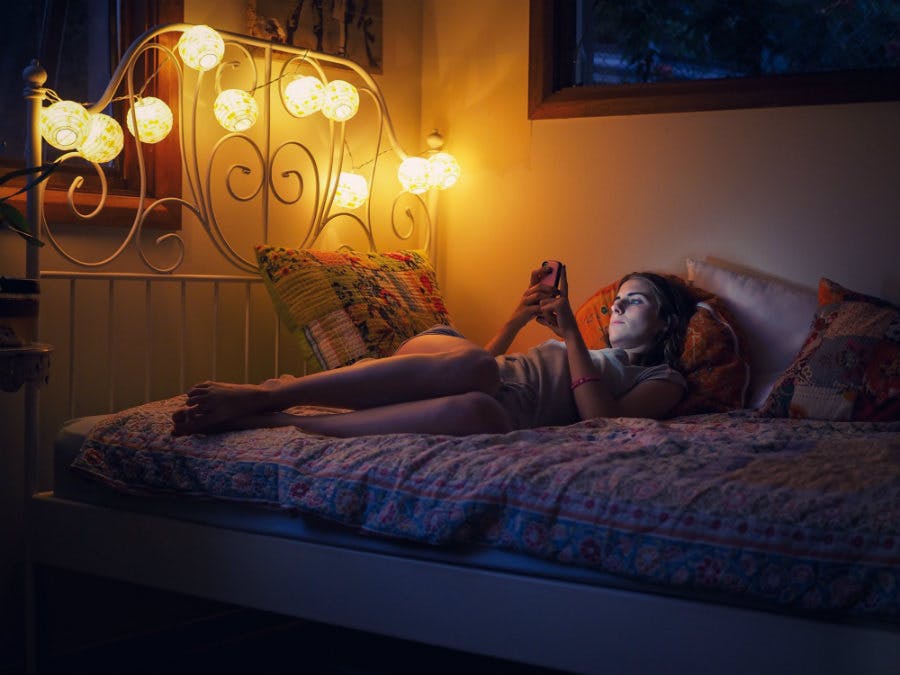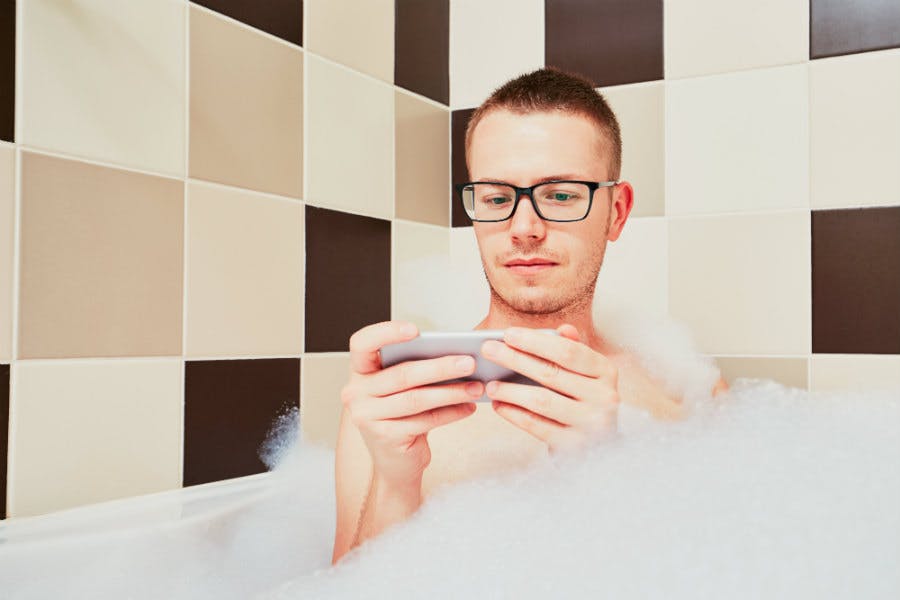7 am. The alarm goes off. You roll over and switch off the alarm, picking up your mobile device in the process. Time to check emails. Or perhaps you’ll pop over to Facebook. Maybe you’ll scroll through the daily news. Whatever you do, you’re starting your day staring at a screen, something statistics show you’re likely to do a lot more throughout the day.
If you don’t wake up and grab your tablet or mobile phone, good on you. You may be in the minority. A study showed that 80% of smartphone users are guilty of checking their device within the first 15 minutes of waking up in the morning. That means most of us are interacting with a screen even before brushing our teeth!
Throughout the day, the trend continues.
If you’re not using your mobile device during your commute, you might arrive at work where a computer awaits you. For the workday, it’s often screens, screens, and more screens. If you don’t work at a computer, you likely check your phone often throughout the day (one survey found 80 times per day was the average).
By the end of the day, you’ve likely spent 2.5 hours on your mobile phone...in other words, 38 days out of the entire year.
Our computers, mobile devices, tablets, and even our televisions play a major role in our lives. The incredible expansion of technology over the past decade has brought with it innumerable benefits. Smartphones are part and parcel of the way we socialise, find entertainment, stay informed, and even do business. We couldn’t live without our screens.
But the question remains: are we spending too much time with them? How much screen time is too much? And is excessive screen time creating problems in our lives? Let’s explore.
Sleep Problems? You Might Blame Your Device
There’s plenty of evidence showing that using screens before bed can have an impact on your sleep health.
Interacting with your phone in the evenings can wreak havoc on your circadian rhythm---your internal clock. Exposure to light can cause the suppression of melatonin, a hormone that helps your body know when it’s time to sleep. While all light does this, the biggest culprit is blue light, which is emitted by devices such as smartphones, tablets, and TVs. Blue light is interpreted in the brain as daylight, so your mind thinks it’s not yet nighttime and becomes more active and engaged. This will certainly make it more difficult to fall asleep or to feel rested during sleep.
If you experience frequent insomnia, you may want to take a look at your screen habits. Are you using your smartphone within a couple of hours before heading to bed? It’s likely that this habit is impacting your sleep---either lowering the total number of hours of sleep or resulting in lower-quality sleep.
Poor sleep is not a recipe for good health. Research points to lack of sleep or poor-quality sleep as contributing to maladies like depression, weakened immune function heart disease, or diabetes. And a lack of melatonin (perhaps stemming from blue light exposure) could even leave you more vulnerable to cancer. Melatonin has been shown to be a powerful part of prevention against cancer.

Sweet dreams? Your screen time might be preventing them.
You don’t need to be a scientist to understand the obvious other ways in which using screens could affect sleep. The stimulation of onscreen activity creates physical reactions in our brain, but it also causes our minds to seemingly work double-time. If you weren’t worried about something before falling asleep, chances are checking your phone introduced you to some new ideas. It could be anything---photos of friends, a news story---but your brain is processing this new information, and is likely much more alert than it would be if you hadn’t picked up your device.
Physical & Mental Health Concerns
Too much screen time could be to blame for a variety of physical and mental health problems. One of the most obvious is eye strain. In a 2016 survey, 65% of the respondents claimed that they experience eye strain after gazing at a computer screen for several hours. Long-term eye problems can occur, as well. Computer vision syndrome (CVS) is what the American Optometric Association calls a variety of vision problems resulting from digital eye strain. Symptoms of this include eye dryness, irritation, double vision, neck and shoulder pain, and eye strain/ache.
Studies reveal that all that screen time is going to our heads, too, and not in a good way. Turns out, it could be changing the physical structure of our brains. (Yikes). The overstimulation from continuous exposure to screens can promote structural and functional changes in your brain. This can particularly affect areas of the brain in the frontal lobe, such as those related to impulse control, emotional processing, and decision making. This is one reason that paying attention to children’s screen time is important, as impacts on the developing brain could be problematic.
Could excessive device use be contributing to anxiety? Quite possibly.
The ways in which it relates can take a number of paths. On one hand, the influence of screen usage on sleep quality could correlate to increases in anxiety and depression. There’s no doubt that sleep problems are inextricably linked to possible emotional distress. In fact, individuals suffering from insomnia are 10x as likely to have clinical depression and 17x as likely to have clinical anxiety, when compared to those who have normal sleep patterns.
On the other hand, the act of using the device itself could be to blame for issues with mood. In a fairly modern survey, respondents admitted to addictive smartphone use related to a concept called FOMO, or the “fear of missing out.” This is a relatively new term, but the idea is familiar to most. Social media---readily accessible via a screen---allows us instantaneous glimpses into what our friends and the rest of the world are doing. If we don’t check in with our phones, we worry we might miss out on some essential update or piece of knowledge. To remain part of the action, we need to be perusing our phones as often as possible, theoretically.
But the idealised picture that social media often paints can make FOMO turn into complications with self-confidence or experiences of envy. It’s easy to fall into the trap of viewing things through a rose-tinted lens, feeling like other people have perfect lives. Women seem particularly susceptible to such problems. Those who displayed "problematic internet use" reported decreased self-esteem and reduced satisfaction in life.
This is most definitely a recipe for anxiety---and not just related to specific concerns.
Too much screen time has been linked to higher levels of general anxiety or depression. Individuals who overused their phones displayed higher scores on the depression and anxiety scales because this excess screen time could “interfere with other pleasurable activities and disrupt social activities, thereby reducing behavioural activation and subsequently increasing depression.”
A number of studies have also been released connecting screen usage to specific mental health problems including obsessive-compulsive disorder, ADHD, and other psychiatric illness. These studies often cite ‘Internet addiction’ as a culpable party.
We may even be physically addicted to our phones. When we check our screens we get a rush of dopamine. Seeing those Likes from friends or playing a game you enjoy can create happy feelings which the brain will associate with pleasure and with reward. Once it becomes an addiction, we find that we can only get that same ‘high’ by looking at our screens, until soon, we become anxious simply because we aren’t looking at our screens. This is when it becomes a problem.

Do you feel anxious when you don’t have your phone on you? Many of us are literally addicted to our devices.
5 Tips for Reducing Your Screen Time
Perhaps you’ve seen the evidence all too clearly. You’re spending too much time on your phone.
Don’t fret. It happens to nearly all of us (and we’ve got the statistics to prove it!) The good news is, awareness is the first step. Once you’ve observed some excessive screen behaviour taking place you can take action to make the proper changes. Here are 5 tips you can try right now to spend less time with your smartphone, tablet, or TV.
1. Practise mindfulness.
Mindfulness is the practice of awareness; of being in the here and now and experiencing the present moment fully. You don’t have to call it mindfulness, but essentially, if you’re looking to cut down on time spent with your device, put it aside during key moments of your day.
At dinner, leave your devices away from the table and instead focus on the meal and on the company.
If going for a walk, head out without your smartphone and put all your attention into experiencing the world around you.These small changes can help separate you from your phone and allow you to make the most of various moments in your day.
It’s also important just to consider where you want your attention to be. Is your phone causing you to miss your life? So many of us bring our smartphones everywhere, and we even use them when spending time with friends. It would be better in nearly every case to put down the device and focus on what’s in front of us. Take time regularly to ask yourself where your attention belongs. This will enhance your quality of life and help set you free from screen addiction.
2. Set limits and boundaries. Give yourself a “time out” from devices.
As adults, there’s no one else to tell us what to do. So we must be strict with ourselves and set boundaries to help us do what is in our best interest.
For screen time, you may need to be quite deliberate about putting away your tablet or laptop at a certain time of night. Since we know how harmful using screens at night can be, why not make it a habit to shut down your devices around 7 pm? This will afford you plenty of time to spend conversing with family, reading a book, or pursuing another hobby that brings you joy. By the time you plan to go to sleep, it’s likely your body will naturally feel much more relaxed and ready for bed.
Give yourself phone ‘time outs’ throughout the day, too. Think about which times of day you tend to look at your device most habitually. You can break the habit of constantly (perhaps mindlessly) scrolling social media or refreshing emails. Instead of simply ignoring your phone, replace it with a better habit. Go for a walk during your lunch break instead of checking Twitter. Or just put your phone in the drawer and relax. These anti-screen moments just might work wonders for your well being.
3. Regularly participate in digital detoxes.
It’s not just about putting down your phone more each day. Now and then, we all deserve a little digital detox. This means that for a predetermined period---perhaps a weekend or just 24 hours---you consciously choose to avoid digital interaction. This can mean different things to different people, but for most, it should involve no phone, no tablet, no computer, and no TV. You will be amazed at the difference you feel just getting away from the influence of constant connectivity. These dates with detox may also make it easier for you to put down your phone more regularly.

Why not take a ‘digital detox’ this weekend?
4. Use technology to restrict technology.
There are a number of mobile apps and other tools designed to combat our screen addictions. If you’re truly finding it difficult to ‘break up’ with your phone, you might need a bit of external help. Well...there’s an app for that.
Various apps and tools can help you wean off your social media addiction by preventing you from accessing certain websites (those notorious for time wasting like Facebook, YouTube etc.), or can tally up the exact number of hours you’re spending on your device. Seeing the cold hard numbers can often be the rude awakening we need to cut back on screen time. Here’s a great list of apps to help you limit your phone usage.
5. Take frequent breaks.
Sometimes, screens are unavoidable. Technology is an important part of our lives, and for many of us, it plays a major role in our professional world. If you work in front of a computer, for instance, you can’t help but stare at screens for large portions of your day. This can bring with it its own concerns, but you can make it better on yourself by taking frequent breaks. Get up and walk around, spend 10 minutes doing some healing stretches (great for relieving the neck and shoulder pain that desk jobs can often contribute to), or just make an effort to socialise with a colleague. With a few simple changes, you can avoid having screens be your constant companion.
Do you get too much screen time?